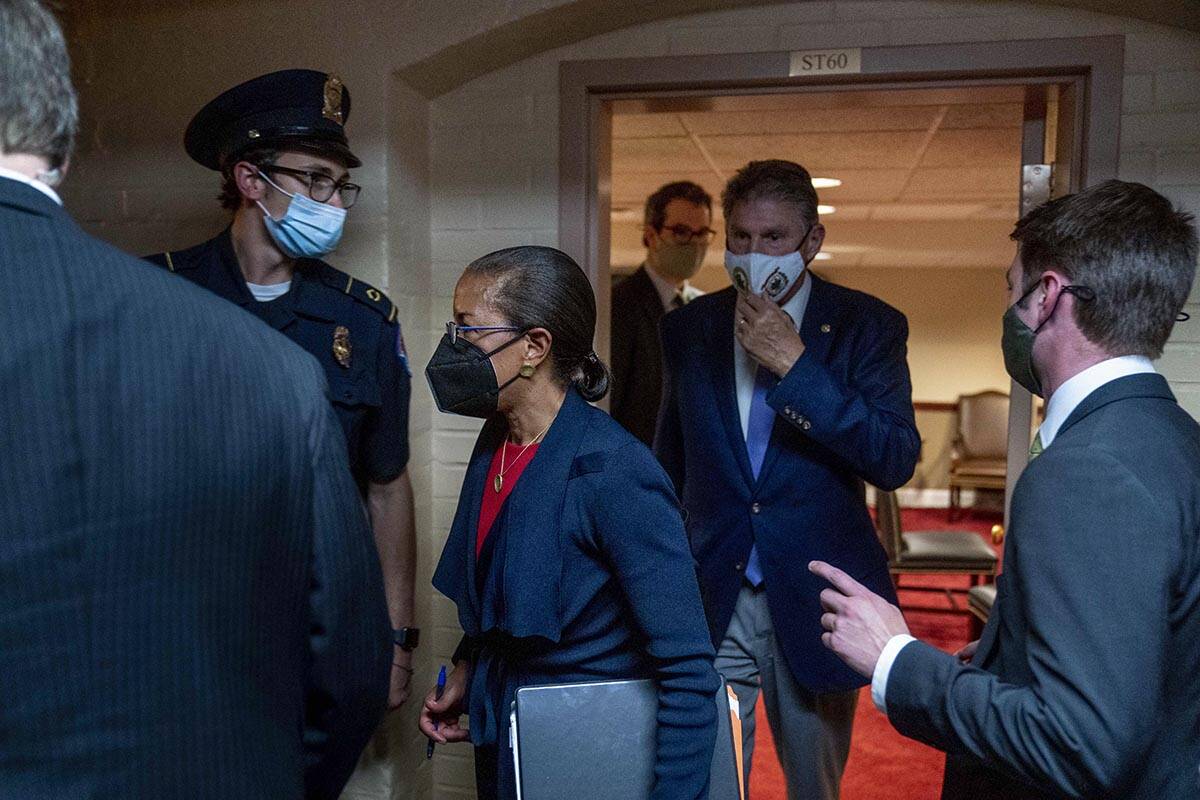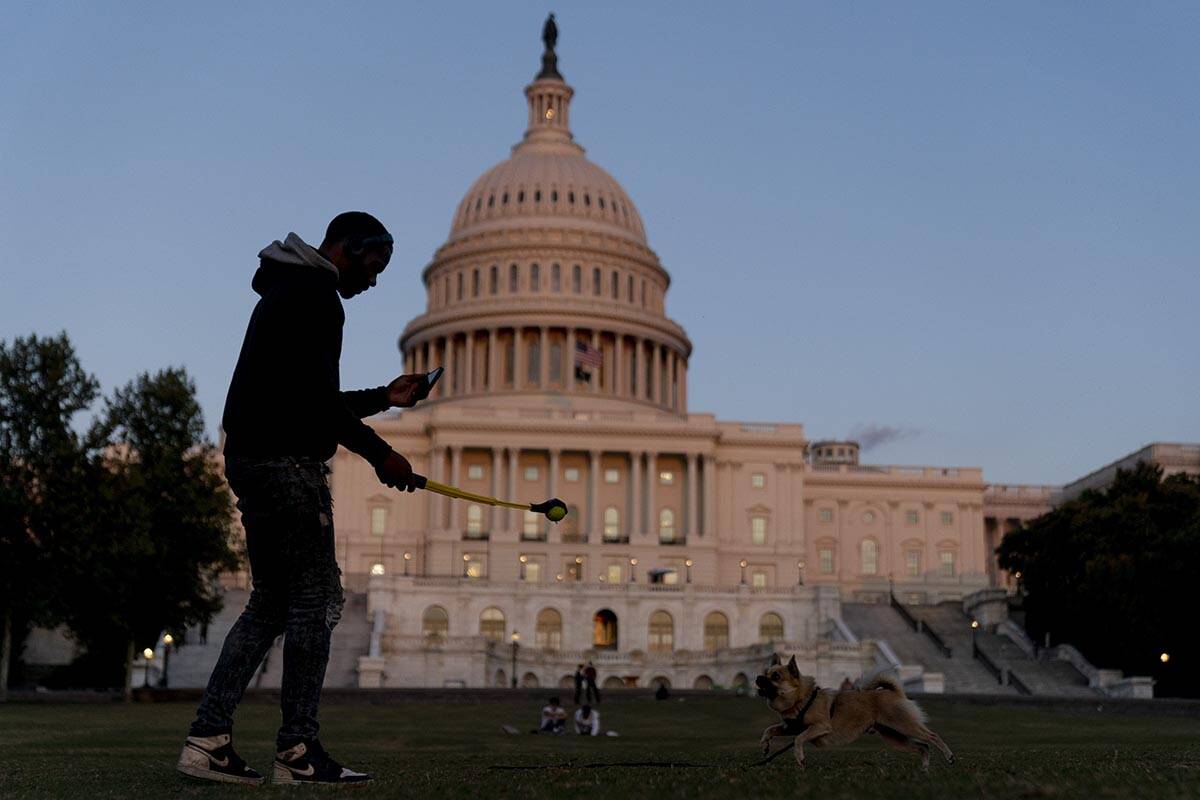Infrastructure bill stalls in House
WASHINGTON — Democratic bickering stalled a House vote Thursday on a $1.2 trillion bipartisan infrastructure bill that includes $4 billion in funds for roads, bridges, airports, rail and water projects in Nevada.
Negotiations continued into the night as moderates and progressives in the party tried to iron out differences in a separate $3.5 trillion budget reconciliation bill with social programs known as the Build Back Better Act.
House liberals want a commitment and framework on the larger reconciliation bill before they vote to pass a transportation package written by Senate Democrats and Republicans.
Some Democratic moderates in the House and Senate, who could face reelection challenges, have balked at the cost of the larger package to address child care, climate initiatives, elder care and health care benefits — paid for by a rollback of tax cuts passed in 2017 by Republicans.
House Speaker Nancy Pelosi, D-Calif., told reporters she was working “hour by hour” to forge a deal that would send the two bills to the president. But later when asked when the vote would occur, she said: “When we bring it to the floor.”
President Joe Biden cancelled a COVID-19 event in Chicago this week to lobby Democrats and push the legislation through Congress.
Biden has made the infrastructure bill and the proposed $3.5 trillion budget reconciliation bill top priorities of his agenda in his first year in office.
But the president has remained open to compromise within the party, and with Republicans, to nudge both bills over the finish line and enact them into law.
Talks ongoing
Senior White House aides met with Senate Majority Leader Chuck Schumer, D-N.Y., late Thursday evening as negotiations continued.
House and Senate lawmakers were still writing a framework for the reconciliation bill, to include climate initiatives, education funding, child care and increase in taxes on corporations and wealthier Americans to appease progressives.
Senate Democratic moderates Kyrsten Sinema of Arizona and Joe Manchin of West Virginia have called the $3.5 trillion price tag on the reconciliation bill excessive. Manchin tossed out a figure of $1.5 trillion on Thursday, a figure Senate progressives slammed for being too small to achieve their goals of providing needed help for children and seniors.
“I don’t see a deal tonight,” Manchin said following a meeting with Schumer and White House aides. But he added that progress is being made and predicted an agreement within reach.
House progressive Democrats, meanwhile, have threatened to tank the smaller infrastructure bill if their demands were not met on the reconciliation legislation.
The infrastructure bill passed earlier this year in the Senate with a bipartisan majority was crafted to create high-paying jobs as the nation recovers from the coronavirus pandemic.
Lee supports in speech
In a speech on the House floor, Rep. Susie Lee, D-Nev., said the infrastructure bill was needed in Nevada.
The state still has the highest unemployment rate in the country at 7.7 percent, with the Las Vegas metropolitan area hovering at 9.4 percent.
“Nevada, where I am from, has been ground zero for this pandemic,” said Lee, a member of the House Appropriations Committee.
Fellow Nevada Democrats Dina Titus, a House Transportation and Infrastructure subcommittee chairwoman, and Steven Horsford, who sits on the tax-writing Ways and Means Committee, also support the bill.
Titus and Horsford also support the reconciliation package.
Although the transportation bill received strong GOP support in the Senate, the Conservative Political Action Conference and the American Conservative Union notified House Republicans that the groups would “score” the bill for their annual conservative report cards and urged a “no” vote because of climate initiatives and money to “advance racial equity.”
Republican Rep. Mark Amodei of Nevada backs transportation projects for the state and told Las Vegas business leaders last week that he was cautiously optimistic the transportation bill would pass.
The U.S. Chamber of Commerce, the Nevada AFL-CIO and other groups support the transportation bill.
Proponents of the $1.2 trillion infrastructure bill, written by Senate Democrats and Republicans, claim the legislation will create jobs to repair and build roads and bridges, improve water supplies, provide incentives for electric cars and expand broadband access.
$4B for Nevada in proposal
Nevada would see about $4 billion in project and grant spending contained in the infrastructure bill, according to the White House.
There would be $2.5 billion alone for Nevada highways, providing funding for I-11 from Las Vegas to Phoenix and money for improvements on I-15 that connects Las Vegas with Southern California, among other highway projects in the state.
The state would see $225 million for bridge repairs, and $459 million for public transportation projects, according to the White House.
About $100 million would be made available to Nevada to expand broadband internet access across the state, according to Sen. Jacky Rosen, D-Nev., who helped write that portion of the Senate bill.
The funds would also be used to provide assistance to roughly 825,000 low-income residents who currently cannot afford broadband service.
Water systems that include a recycling plant would see $400 million in federal money. That project was slipped into the bill by Sen. Catherine Cortez Masto, D-Nev. Lee sought the funds in the House.
Cortez Masto also secured funding for wildfire prevention.
The state would see roughly $293 million to improve airports, according to the White House, and $38 million for electrical vehicle charging systems.
The bill would also provide funds to expand rail service in states nationwide, including Nevada, and improve the nation’s electrical grid.
Biden said infrastructure investment is critical to keep America economically competitive with other countries, particularly China.
Contact Gary Martin at gmartin@reviewjournal.com. Follow @garymartindc on Twitter.
























